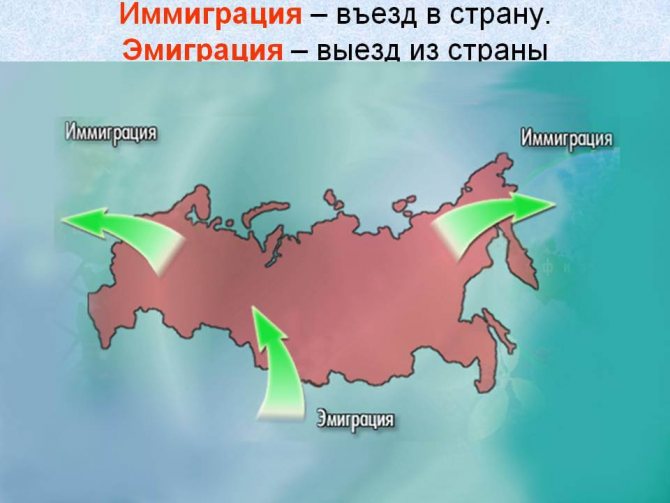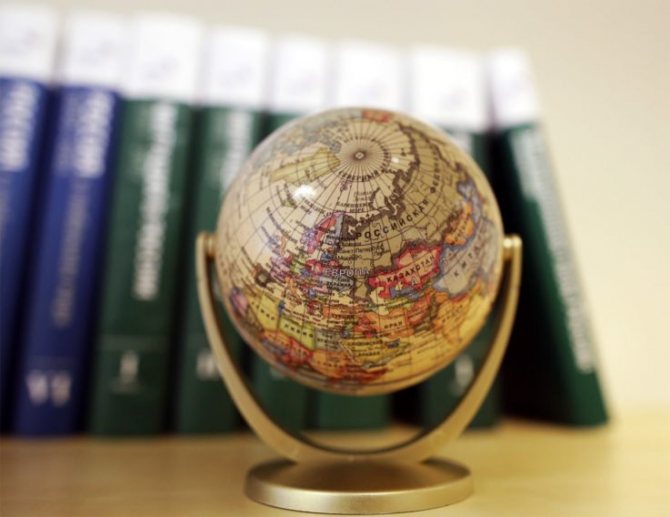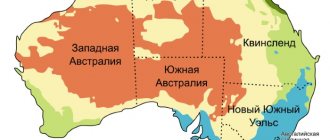The meaning of the concept "migration"
It is necessary to define what population migration is. Without this, it is impossible to understand the concepts of “emigration” and “immigration”. Translated from Latin, the word means “relocation.” Therefore, migration is the movement of people from one region to another in order to settle permanently or temporarily in the area. In relation to the topic of the article, this is a generic concept.
Types of migration

There are many signs for its classification. The main one is territorial. It defines the following types of migration:
- internal (movement within the country);
- external (moving to another state).
Based on time, it is divided into:
- temporary (assumes a quick return);
- permanent (moving to change place of residence for a long time);
- pendulum (characterized by frequent movement from one location to another, for example, for study);
- seasonal (related to the performance of work determined by the time of year).
The Main Directorate of Migration Affairs of the Ministry of Internal Affairs of the Russian Federation deals with the question of how many migrants there are in Russia. The responsibilities of this service include recording foreign citizens who arrived in the territory of our country.
Basic Concepts

Emigration
Derived from the Latin word “emigro”, the exact translation is “evicted”. Thus, emigration refers to a certain process in which people move from their country, in which they previously lived permanently, to another state. In this case, such a person will be called an emigrant, regardless of whether he is leaving in order to find a new permanent place of residence or planning a temporary stay.
And again, for many people, some confusion creeps in. So what is emigration? In other words, a person, for whatever reason, leaves his country, crosses the border of another state, and is automatically assigned the status of an emigrant. Then a logical question arises: is a tourist also an emigrant? Absolutely false. Unlike an emigrant, a tourist or business trip is short-term in nature, has its own specific and already designated end date, and emigration implies a long stay within another country.
In this case, a person may have one or a group of reasons for emigrating. He can leave the country because:
- cannot provide for himself in his homeland materially;
- fails to realize himself spiritually;
- wants to get education or long-term medical care abroad;
- military operations take place on the territory of another country (mainly for the category of people liable for military service);
- there is a desire to return to the homeland of our ancestors;
- There is an opportunity for career development in a foreign company.
Despite the reason for leaving, this is not always associated with the loss of citizenship of one’s native country and the automatic acquisition of citizenship of another state.
Immigration
The definition is opposite in meaning to emigration. So what is immigration? Simply put, if emigration is leaving, then immigration is entering the country. Very often this definition is confused with the word “migration”. The latter means moving within the country rather than entering it. The reasons for the occurrence of this process are very closely intertwined with emigration characteristics; it may be:
- differences in living standards between countries;
- availability of additional economic opportunities;
- the opportunity to get a good education or a lucrative job offer;
- more developed social structure;
- military actions, as well as political persecution.
Migration
Defines processes such as movement, resettlement of people from one region of the country to another, but of the same state. This is due in most cases to the fact that the citizen is looking for better living conditions or employment. In recent decades, it has become widespread and large-scale, which undoubtedly affects the economic state of both a single region and the economic development and demographic balance of the entire country as a whole.
If we consider the issue of migration on a national scale, then people are naturally attracted to larger cities, where there are better living conditions and more development opportunities. If previously a migrant chose a smaller city, but more or less close to him, now with the development of the transport industry, this trend is decreasing. A person is ready to travel thousands of kilometers just to get to a metropolis where there is work and the opportunity to study. As a result, the population of such cities begins to increase due to migrants.
There are several types of migration:
- territorial;
- temporary (with return to home region);
- cause-and-effect;
- by implementation method.
Migration is mainly internal in nature, that is, relocation occurs within either the country or within one territorial unit. For example, people move from a village to a city, from a small town to a large one, from one region to another, etc.
Another classification criterion is duration. According to him, migration can be:
- temporary, in which moving to another place presupposes a certain temporary condition. When the period of residence expires, the migrant is obliged to return to his small homeland;
- forced. It is a consequence of failure to comply with the designated framework for temporary migration. The instrument of influence in such cases is deportation;
- seasonal. Occurs when a person is connected to another city or region by work for one season;
- pendulum The shortest type of migration. Associated with the location of the place of work or study, when trips are monthly, weekly or even daily;
- constant. Justified not only by the desire, but also by the ability of the migrant himself to remain in the chosen place permanently.
Temporary migration plays an important role in the economic development of the region, but permanent migration contributes to demographic growth.
Re-emigration
People may want to leave their home country for various reasons. But, as they say, it’s good where we are not. Some easily adapt to a new place and remain for permanent residence, while many after a while decide to return back. In this case, they accept the status of re-emigrant.
And, accordingly, re-emigration is a return. If you look in the dictionary, this term closely echoes another definition, namely “repatriation”; they are very often used as synonyms.
Immigrant and emigrant
Based on the above, we can conclude that:
- an immigrant is a foreigner who decided to temporarily or permanently move to another country and ultimately entered it;
- An emigrant is a citizen of his state who decided to leave it.
For many people, it is very difficult to understand the difference between these two concepts, not only due to their similar sound, but also the similarity of meaning. It's actually simple.
Example. Mr. Ivanov decided to leave Russia and move to Italy. In this case, for the Russian Federation he will be an emigrant, and for the Italian state - an immigrant.
To put it simply, to make it easier to understand and remember this difference in terminology, it is recommended to draw an analogy between the import and export of goods. Only in this case will a person be the subject of consideration.
What is emigration

Emigration is leaving a country in order to find a new permanent place of residence. The key factor defining the concept is the need to leave one’s homeland. That is, this is the relationship between a person and the state from which he came. This does not imply a mandatory change of citizenship.
The second factor is the length of stay in another country. A person leaving on a tourist holiday or business trip will not be an emigrant, since his goals include a mandatory return.
Main reasons
There are three basic types of emigration:
- economic;
- political;
- military
They are determined by the reasons that prompted a person to move. So, the first means searching for work, better living conditions and starting a family. The second involves moving in order to escape oppression on racial and religious grounds, which are often caused by the established political regime. The third happens in the presence of a military conflict and a real danger to life.
Government agencies maintain statistics on emigration from Russia. For the most part, people leave the Russian Federation in order to earn money and build a business.
Methods
It is possible to move to another country either with or without obtaining citizenship. The concept of “emigrant” implies several ways to become one. For example, you can go to another state for training or in connection with getting a job.
Some states offer to become their citizen by investing a large sum in their development or purchasing expensive real estate.
There is also such a method of emigration as moving for family reasons. It covers marriage and reunification with relatives living in the territory of another state.
The Russian Federation recently adopted a new law for migrants. It regulates all stages of entry into and exit from Russia.
The concept of re-emigration
A situation is possible when a citizen who has moved for permanent residence to another country decides to return to his homeland. The term “re-emigration” characterizes this. Perhaps the living conditions were not what they expected, or the person overestimated his ability to tolerate a different climate.
Emigration: reasons and ways to leave your country
If we talk about emigration, then this is the process of a person moving to another country for permanent residence. The migrant makes this decision due to certain circumstances.
These include:
- difficult political, economic, environmental situation in the country of residence;
- return to the historical homeland of their ancestors;
- inability to receive education, undergo treatment, or realize oneself in the country of residence.
Note! Emigration can be for work, study, business, or through the purchase of real estate.
The main reason for emigration is the search for better living conditions. This includes getting a good education, a well-paid job, and improving your living conditions. Accurate migrant statistics are quite difficult to pinpoint.
There are several services that keep such records. Also, people do not always leave for a while, and not forever. Some do not come to their place of registration to deregister. The number of people emigrating from Russia is taken into account by Rosstat, based on data from the Ministry of Internal Affairs and the Migration Service.
Most people emigrate from Russia to European countries. This is due to the higher standard of living there. As an example, it can be noted that in developed countries in Europe and America, even the unemployed have at least one car, which they can afford with social benefits. While in Russia a car is considered a luxury item that not every working citizen can afford, especially in the provinces and villages.
Important information for expats
When emigrating, you should consider the difference between living in a country with a visa and work permit and living as a permanent resident. In many countries you can live quite a long time with a work visa. But at the same time, a migrant is not considered a citizen of the country, he is just a guest. Accordingly, the state does not provide him with any social guarantees. He cannot receive medical care through social insurance.
After emigration, a person faces many problems associated with adaptation to a new place. Therefore, such a decision is not made spontaneously; everything must be carefully considered. The citizen renounces his culture, language, and usual way of life. This is very difficult for especially sensitive people, especially for people of middle and old age. Social adaptation in another country
One of the most necessary skills for both emigrants and immigrants is knowledge of the language of the host country. In most countries, this must be confirmed by an appropriate certificate, which opens up good prospects for the visitor. Also, states often have lists of in-demand professions, which are also worth studying before leaving. For example, engineers and programmers are in demand in Canada and the USA. But finding a job as a translator or teacher is quite difficult.
Why do people leave?
Migration issues are different in every country. And depending on the state policy towards migrants, the comfort and well-being of the immigrant’s stay in the country will be envy. Most often, people move to countries with a higher standard of living, which includes the opportunity to receive a better quality consumer basket, social guarantees from the state, provision of living space, security, education and employment with good wages.
Emigration from Russia includes several historical streams. They were mainly associated with political motives. The Soviet government oppressed creative people (poets, writers, artists, artists) in every possible way, so they sought to go abroad, where they could create freely. Currently, people emigrate to other countries more to get education and good work, a higher standard of living, and a secure old age.
If we talk about the age of migrants, then almost 80% of the flow of moving citizens is young people under 30 years old. This is explained by the mobility of this population group, their desire to find a better place for themselves in life. People of retirement age are also emigrating from the country. But they have other reasons for this. Most often, older people move to other countries for ethnic reasons, trying to return to their historical homeland, or move to live with their children and grandchildren.

Immigration
Now let's talk about who are immigrants? This concept characterizes the relationship between a citizen and the state into which a person enters. Therefore, immigration is arrival in another country.
Reasons for moving
The circumstances that force a citizen to change his place of residence are exhaustively described as reasons for migration. This is a search for better working conditions, an attempt to avoid discriminatory persecution, as well as the presence of a military conflict in the homeland.
It is immigrants fleeing fighting that have flooded peaceful countries over the past few years. In this regard, the question arose about the definition of the term “legal status of refugee”. In many states it is defined at the legislative level.
Nuances of choosing a country
It is important to remember that moving involves not just a new territory to live in, but also a different culture and way of life. The current situation in the world with emigrants from the Middle East who arrived in Europe shows that people were not ready to live in another society and obey its laws.

When choosing a state to move to, you need to study how the government treats migrants. Are there equal opportunities for work and housing for both its own citizens and foreigners?
It is important to determine whether the cultural realities in society are very different and whether you can adapt to them. Climatic conditions also play a significant role.
The choice of place of residence should be approached with all seriousness. If you choose the best countries for emigrating from Russia, then these are Norway, Switzerland and Canada. It is there that it will be easier to adapt to local life.
Expats and immigrants: what's the difference?
Immigration
An emigrant is a person who leaves a country. A person who comes from another country is an immigrant. The difference is in the direction of travel.
These two concepts are interchangeable. If a Russian citizen immigrated to Italy, this will mean that for Italy he is an immigrant, but for Russia he is an emigrant. Be that as it may, the resident still left one country to settle in another.
Note! To remember the difference between the meanings of words, you need to know that the word “emigrant” always applies “from”, “from”, and the word “immigrant” - “to”, “where”.
What factors should you consider when moving to another country?

When choosing a state to live in, it is necessary to take into account the attitude of local authorities towards citizens who have moved. In some countries, such as the United States, immigrants can be employed on the same basis as the local population. In Japan, it is very difficult for a non-citizen to find a job.
Before moving, you should study the culture and life of the country you have chosen to emigrate. Understand whether it will be difficult to join the local society and how it treats foreigners.
It is worth choosing suitable climatic conditions. There is no point in moving to Latin American countries if you cannot tolerate heat and high humidity.
The most attractive countries for emigration

According to statistics, the following countries are the most popular for emigration among Russians. The list is presented in order from the least visited state to the most popular.
- Cyprus . The flight from the capital of the Russian Federation will take only a couple of hours, so subsequently there should be no problems with regular trips to friends and/or relatives. It has a favorable climate with good environmental conditions. There is practically no language barrier. The procedure for obtaining documents for permanent residence is accessible.
- Dominican Republic . Its authorities are interested in the influx of foreign citizens, especially businessmen and highly qualified specialists. Initially, a residence permit is issued; after five years, a person can obtain citizenship.
- Hungary . In addition to beautiful nature and good ecology, the country has a low crime rate, the opportunity to get an excellent education and further employment. Moreover, the state is one of the richest in the European Union. Having received citizenship, you can travel freely throughout any EU country.
- Poland . The mentality is very close to Russia; Polish is quite easy to learn in a short time. The country is constantly progressing both in the economic and social sectors.
- Israel . The main attractive characteristics are: decent salaries, developed infrastructure, high level of medicine, excellent maritime climate and much more. However, getting into this country is much more difficult than others on the list. To do this, you must either have relatives with Jewish roots, or marry a citizen of this country.
Emigration from the USSR
It is believed that the second wave of Russian emigration dates back to the times of the Soviet Union. Thus, the number of migrants abroad increased significantly in the period 1941-1960. This includes military personnel who did not return to the Union during World War II, as well as refugees who left the state along with German troops. People who fled from the Soviet occupation zones of Austria and Germany also crossed the border. The majority of emigrants of those years were Poles, Ukrainians, Germans, Jews, Balts, Belarusians and Russians.

The third wave of emigration occurred in the 60-80s of the 20th century - the period of de-Stalinization and until the beginning of perestroika. Among those who left are Armenians, Germans, Jews, as well as a small number of Ukrainians and Russians.









